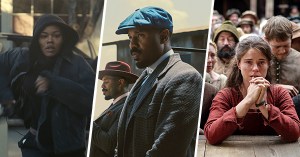"For Your Consideration": Christopher Guest and Eugene Levy Probably Won’t Read This
"For Your Consideration" director Christopher Guest told RT he doesn’t read reviews, trade publications, or infotainment television. But he does make some darn funny movies with some of the most talented improv players around. Read on for snippets from the interview with Guest and co-scripter Eugene Levy.
On their one-day press stop in San Francisco a few weeks back, "For Your Consideration" co-writers Christopher Guest and Eugene Levy (both of whom also star) sat with a group of journalists to talk up the new ensemble pic, the latest in a successful run of quasi-improvised comedies ("Waiting For Guffman," "Best in Show," "A Mighty Wind").

Christopher Moynihan, Harry Shearer, Catherine O’Hara and Parker Posey on the set of the film-within-a-film, "Home for Purim"
Rotten Tomatoes was on hand with an assembly of fellow internet and newspaper writers, including among them a few overzealous fans of Guest and Levy’s filmography. Levy, popularly known as the dad from "American Pie," and Guest, infamously more straight-faced in person than any of his onscreen personas (a little more Harlan Pepper than Corky St. Clair), answered questions about their unusual filmmaking process, their talented cast of regulars, and their latest provocation of plastic surgery abuse in Hollywood. And of course, how about those Oscar prospects?
The Roundtable Begins
Q: What makes the creative form of scenario and improv so appealing?
Christopher Guest: Well, I think beginning with a film I worked on called "This is Spinal Tap" —
[Applause breaks in from nerd at table; CG surprised.]
Nerdly Journalist: Oh seriously, come on! Journalistic integrity is going out the window today.
CG: [Deadpan] Wow.
NJ: I was hoping Nigel was gonna be here, but that’s just me…
CG (continues): We really had a lot of fun doing that movie and it occurred to us that that particular format was something where we could…be funny, and when I did Waiting for Guffman, it occurred to me that maybe we could try that again. So we did three in that format; this one is a departure because it’s a narrative and it’s not done as documentary, but there’s something about improvisation — the spontaneity of it — which sparks the actors that we work with here, and there’s a different feel, the comedy is different. It’s fun.

Christopher Guest behind the scenes on the set of "FYC"
On Working the Press
Q: In FYC, of the many targets that you take on, this (junket) process is one of them. How do you feel about this process?
CG: Well, that’s come up. Obviously in the movie we don’t literally do junkets per se, but we do different interviews in the movie. As with anything, the people — you would notice that — but of course we’re talking about actors and managers and directors and producers and every possible person, talk show host…but this process, after the fact, is a very surreal one — especially since we just did this in the movie.
But I worked for two years on this film, and you talk about it five hundred times. And I have had people —- it’s obviously more fun to have people in a comedy movie asking stupid questions; if they’re asking intelligent questions, there’s not fun in the thing. Or Eugene playing a smart agent, there’s no fun. Or, you know, a good director.
So I have been in situations where you sit down, and you’ve worked hard on a movie, and the person will say, "What’s your favorite color?" And you think, you have to be kidding. There must be something else, just think of something else. And just a few months ago, one of the first interviews on this, it was a phoner, and someone said, "What was it like working on the movie?" "Oh, it was fun…" "Do you have any pets?" And I was really taken aback. "Well I do…" They had run out, they’d just run out, after one question, they’d run out of ideas. No one would believe this if you showed this in the movie, they’d think this is too, too stupid.
On Comedy
Q: When it comes down to it, is all comedy about failure?
CG: Well, it’s about versions of failure; as I was saying before, you don’t make comedies about people who do things well. Going back to silent films with Laurel and Hardy, they’re totally incompetent, each one thinks the other one’s stupid, they’re breaking things, they’re falling down, things are falling on them. There is no movie if they just move a piano and its just they move it and they deliver it and they leave. Something has to happen. So ultimately, I think that’s true, and in this case we want to go a step farther and in this film Catherine O’Hara — Catherine is one of not many actresses that can pull off both sides of this, where she’s incredibly funny but can also shift into an emotional area that surprises people and it’s just amazing, that transition. So I think there’s some poignancy at the end, which is very important.
Q: Tragedy is also about failure…
CG: Yeah, but it’s not funny!
So we’ve worked in comedy, and to be able to touch on both areas is more interesting to us than just a series of jokes and then you go home.

Actor Victor Allen Miller (Harry Shearer) and his agent, Morley Orfkin (Levy)
Guest, On His Filmmaking Style
Q: Do you just work on one thing at a time?
CG: Oh, no. I think most people do, most people — certainly film directors — have multiple things in development, ’cause things fall out and change. I can’t personally do that, I have one thing that I do, period. Other actors are working in different things until we do this, but I have one thing, there’s not a drawer filled with A, B, C. And I finish it, and typically people say, "What’s next?" And I say, "Nothing." And then they look at you like, "Well, what do you mean?" and I say, I need to take time to think what the next one is, which could be a year, and has been in the past.
Q: What is your shooting schedule like?
CG: 27 days. Which is so much less than a regular movie…obviously the schedule for a typical film can be 80 days, whatever…this is, they’ve all been, roughly within a few days of each other. But I edit for almost a year. So it’s almost the complete inverse; most people, they’ll be an assembly of a movie within a week after shooting a regular movie, and the director can look at it and they start their process which is much less time til the movie comes out.

Jane Lynch and Fred Willard skewer entertainment television as talking heads Cindy and Chuck
On Movie Critics and Hollywood
Q: Considering the depiction of the Love It/Hate It critics in the movie, what do you really think of movie critics? And do you read reviews of your own movies?
CG: I don’t read reviews, I don’t watch anything about show business, I don’t read any showbiz periodicals, I don’t read any calendar sections about anything, I don’t watch any showbiz shows. So that really was taken from, someone made a tape for me of a bunch of, a montage, of some other…things…and it’s not based on anything that exists. And I love the name of the show — cause that could be a show, very simple, Love it/hate it — but I don’t personally read those things.
NJ: In that culture of shows which you don’t watch — the snipey, who’s looking good on the red carpet kind of thing — the elephant in the room that nobody talks about is…plastic surgery in Hollywood, and you obviously take that on…
CG: That’s right. Yes.
[pause]
NJ: Are you worried about a backlash, or…?
CG: Meaning what, what would happen? Death? What would happen?
Eugene Levy: Some plastic surgeon is not gonna want to work on you…
On Oscar Nominations
Q: Are you guys smelling Oscar for this?
CG: Well there’s a good question.
NJ: Peter Travers of Rolling Stone mentioned Catherine [O’Hara] for an Oscar, and it’s kind of funny that it’s this little Oscar buzz movie with at least one prominent critic mentioning it.
EL: Well, that’s kind of what it is, that’s what it’s about. Somebody mentions a thing, and now you’re mentioning it, and it just perpetuates the–
CG: Until you said that, I wouldn’t have known that because I don’t read that, so it’s even weirder that we’ve made a movie about that but I don’t know…seriously, it’s weird, because I don’t go on the internet and start looking at things, I’m living in this strangely insulated…
EL: And somebody else mentioned as well, that there was an internet, uh…
CG: …and someone mentioned that you mentioned, actually, which is weird.
Click here to read the full interview.





